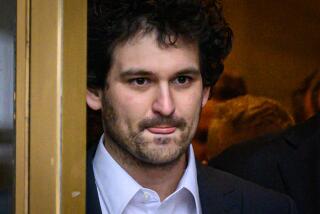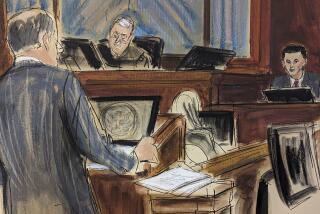Paths Diverge for Fastow, Skilling
- Share via
HOUSTON — Andrew S. Fastow, the former Enron Corp. chief financial officer, spends time these days driving his 6-year-old son to school, stopping at Starbucks to pick up coffee and ducking out of carryout restaurants.
Jeffrey K. Skilling, the former chief executive and the ousted Fastow’s former boss, can be found eating at Houston’s trendiest restaurants, drinking gin at swank bars and attending lavish private parties.
As federal prosecutors aggressively pursue their criminal investigation into Enron’s collapse, Fastow and Skilling, the two men at the heart of the Houston-based company’s dramatic fall, have been leading lives that are starkly different.
While Fastow has tried to fade from public light, sequestering himself with family and close friends, Skilling can be seen at hip restaurants and bars, much as he was during his highflying days at Enron.
Now, the 8-month-old Enron investigation has entered an important new phase. Fastow last week was implicated by a key lieutenant as the mastermind of three off-the-books partnerships, which eventually led to the firm’s filing for bankruptcy protection last year.
Fastow’s former subordinate Michael J. Kopper, who was a managing director of Enron’s global finance unit, pleaded guilty to federal money-laundering and fraud charges and has agreed to cooperate with prosecutors.
Legal experts said Fastow could be headed for a long stretch in jail unless he can provide significant evidence against his ex-boss Skilling and former Enron Chairman Kenneth L. Lay. Both Skilling and Lay have said they were not aware of the extent to which Fastow and others profited personally from the off-the-books partnerships.
One of the big questions in the Enron investigation centers on how much Skilling, as the chief executive, knew about what his chief financial officer, Fastow, was doing. And though close professionally at Enron, the two men no longer appear to be in contact and have charted different courses since the scandal unfolded. Skilling, for example, testified before Congress while Fastow invoked his right not to testify.
There is good reason for their different approaches, former employees and associates said. Fastow was never active in the Houston social scene in the first place, but the increasing scrutiny of federal investigators has prompted him to “circle the wagons” around himself.
Fastow’s close friends, who have rallied around him in the past, have stopped talking to reporters since Kopper’s plea last week. Although Fastow has not been charged with any crimes, his role was outlined in Kopper’s plea agreement.
Prosecutors allege Fastow, Kopper and others pocketed millions of dollars through three partnerships that did business with the energy giant, including a previously undisclosed deal that cloaked Enron’s ownership of lucrative wind farms in California. On Friday, a judge ordered some $23 million in assets owned by Fastow and others frozen amid reports that Fastow’s brother was attempting to transfer some of his gains.
“There was an arrangement between myself and the Enron CFO [Fastow] whereby I did take some of the proceeds which I received from managing and running that partnership and passed them on to he and his family,” Kopper said.
Fastow’s spokesman, Gordon Andrew, who has in the past described his client as trying to lead a normal life, refused to share any details of Fastow’s activities. Fastow, who declined to testify before Congress last winter, has not spoken publicly since he left Enron.
Meanwhile, former Enron employees have met or spotted Skilling at various restaurants and bars, including Anthony’s, Volcano’s and Zimm’s Martini & Wine, many of them in upscale neighborhoods with streets resembling Melrose Avenue in West Hollywood.
Former employees, some of whom worked directly with Skilling and Fastow, said it was hard for them to believe that Skilling was not aware of the transactions since Fastow often consulted with Skilling, who was well-known for remembering the most minute financial details.
Skilling had an “amazing ability” to remember the most arcane details and quickly grasp even the most complicated transaction at first hearing about them, they said.
“He was brilliant in that way,” said a former Enron executive, who like most former employees spoke on condition of anonymity. “It’s hard to believe Skilling didn’t know what was going on.”
Another executive said Skilling was careful of what he signed. Documents approving particular transactions often would have signatures of a number of his subordinates but not that of Skilling.
“I would get these documents with seven or eight signatures on them and the last line that was supposed to have Skilling’s signature would be blank,” the executive.
At a party last month, Skilling told a former employee that he expected the case to drag on for three years, after which he would be exonerated but left with little money.
Skilling resigned from Enron last summer, before the company disclosed huge losses that caused its stock to collapse. After leaving the company, Skilling started a company called Veld Interest, a “business looking for business,” according to a news report. Skilling hired his former Enron secretary and his wife to work at his new venture.
During the day, Skilling often is seen at his son’s soccer practice at a private Episcopal high school where he sits at the top of the bleachers wearing a baseball cap.
Skilling’s former boss, Lay, has slowly begun returning to the social circuit after staying away for months after Enron’s collapse. Lay, who immersed himself in local philanthropic and civic affairs including the drive to build the city’s baseball stadium, can be spotted these days at his wife Linda’s antique store, Jus’ Stuff, where bread plates sell for $50 and gilded chairs for $5,000. He resigned from the company in January.
Fastow, who lives in a 4,000-square-foot house in a manicured neighborhood near Rice University where homes sell for $700,000 or more, has given up on building his dream home near his former boss in the exclusive River Oaks neighborhood.
The 11,493-square-foot home has been listed as one of the properties that prosecutors want to seize in connection with the questionable partnerships. Still under construction, the home, with limestone exterior and slate roof, was put up for sale last month.
A former Enron executive said he spotted Fastow at a carryout restaurant last month; he had disappeared into the bathroom only to reappear five minutes later when his order was ready.
Friends said Fastow has been finding solace in his Jewish faith, regularly attending a synagogue in suburban Houston.
“They’ve been struggling. That’s no rocket science,” said Rabbi Shaul Osadchey, who presides over a small congregation that meets in an obscure office park nestled between apartments and warehouses. “What he needs right now is a rabbi, not a spokesperson.”
More to Read
Inside the business of entertainment
The Wide Shot brings you news, analysis and insights on everything from streaming wars to production — and what it all means for the future.
You may occasionally receive promotional content from the Los Angeles Times.










